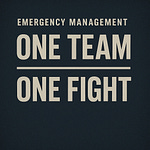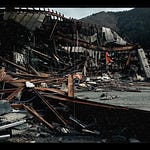Thought Leadership
Over the last week, I have been thinking about reputation. I have a close friend who is beyond reproach and a very ethical person who takes a hit professionally. It has shaken them; they are struggling personally; however, has it impacted them professionally? Then I received a phone call from one of the people I mentor, and they told me how their office was turned upside down, and they were let go, and their boss was fired. As emergency management professionals, we are in the spotlight at times. Brock Long was called the floor of the capital and defended the hard-working men and women of FEMA. The COVID response opened many questions about what emergency managers do, how they function, and the reporting structure. The City of Los Angeles was in the news because of the after-action report that was honest but not flattering.

As a person who lives in the public light, I am sure some of you may sometimes disagree with me. I do not expect all of you even to like me. I hope not personally; however, I try to be empathic and open to other people's views. The problem with reputation is that one person that may not like you can do damage, spread hate, and miss information. That is what my friend is dealing with today. Then the question is, do you trust their leadership and judgment? This is where the value of leadership and reputation can be measured differently.
Leadership
Today jurisdictions are facing economic and geopolitical confusion—the need for leaders who not only bring value above and beyond their traditional offerings. Communities now face unprecedented challenges: inflation, supply chain and commodities disruptions, global health crises, social volatility, wars, food insecurity, homelessness, employment shortages, and more service expectations.
Reputation
Reputation is comprised of the views and opinions of others. The ideas include supervisors, coworkers, community members, partner agencies, and competitors. Reputation comes down to confidence in the individual's ability to deliver efficiently and effectively; however, this varies with each person's perspective:
Why Is Reputation Important?
People perceive a more excellent value and a lower risk in partnering and working with highly regarded individuals. A high reputation means higher quality, lower risk, and more success in achieving outcomes. A leader that enjoys a good reputation among their peers and team will win the trust and attract and retain the best staff and achieve better results, enabling them to enhance their reputation further.
The hard part is that you do not control your reputation. It is a value that others put on you. Now, I say that your hard work and integrity drive how people see you.
Why Thought Leadership Is Critical
One of the mistakes people make is that they mistake opinions with thinking and thought leadership. Thought leadership starts with critical thinking. Critical thinking is the intellectually disciplined process of actively and skillfully conceptualizing, applying, analyzing, synthesizing, and evaluating information gathered from, or generated by, observation, experience, reflection, reasoning, or communication, as a guide to belief and action. Its good form is based on universal intellectual values that transcend subject matter divisions: clarity, accuracy, precision, consistency, relevance, sound evidence, good reasons, depth, breadth, and fairness.
Critical thinking entails the examination of those structures or elements of thought implicit in all reasoning: purpose, problem, or question-at-issue; assumptions; concepts; empirical grounding; reason leading to conclusions; implications and consequences; objections from alternative viewpoints; and frame of reference. Thought leadership is responsive to the variable subject matter, issues, and purposes — it is interwoven mode of thinking, among them: scientific thinking, mathematical thinking, historical thinking, anthropological thinking, economic thinking, moral thinking, and philosophical thinking.

Thinking is learning. Thinking skills are considered to be of central importance to higher-order cognitive learning needed to become a thought leader. Thought leadership in the value proposition and cultivating a reputation has never been more critical. Thought leadership is a step beyond knowledge-sharing: It collates experience and expertise in areas of strategic importance, honing them into innovative and practical solutions and disseminating them. Thought leadership can be advisory services or capacity-building, knowledge-sharing, publishing reports, articles, blog posts, and convening workshops, conferences, and forums.
For emergency management, thought leadership is an important value addition to the profession. We need people to think and write about infrastructure, agriculture, technologies, education, healthcare, and community resilience, to name a few areas of interest.
Thought leaders can increase the profession's capacity and reform how we enable emergency managers to be successful while advancing the concerns of a range of stakeholders, minimizing risk, and enhancing the reputation of the profession and the individual alike. In turbulent times like these, thought leadership becomes all the more critical. With threats and uncertainties growing higher by the day, we need experienced leadership, and strong reputations are vital.
Podcasts
The Todd DeVoe Show
Climb and Lift: EMPower and Building Confidence as a Woman Public Speaker in the Emergency Management Field
EMPower is a group of emergency management women created to provide support, networking, and leadership skills to assist women in their emergency management careers. EMPower hosts events, talks, and networking. Another aspect of EMPower is bringing resources and skills to help women level up in pursuit of executive-level positions if desired. A key role is providing speaking opportunities for women to share their stories and practice their presentation skills. Over the past three years, I have built skills and confidence in speaking at multiple conferences around the country. I hope to share my journey as a speaker and give some tips to encourage others to talk more.
Business Continuity Today
Stay Focused But Not In A Silo
At Times BC professionals are hyper-focused on their job, and that can be a good thing. You may say no to projects that do not fit and you may have to say no to projects to get to a yes. However, you do not want to be siloed. The silo mindset does not appear accidentally nor is it a coincidence that most organizations struggle with interdepartmental turf wars. When we take a deeper look at the root cause of these issues, we find that more often than not silos are the result of a conflicted leadership team.
Supporters














Share this post